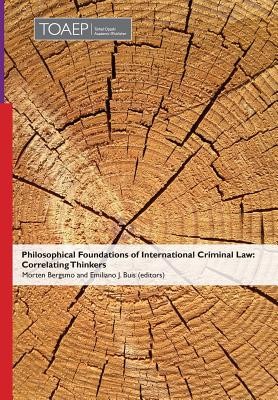
- We will send in 10–14 business days.
- Publisher: Torkel Opsahl Academic Epublisher
- ISBN-10: 8283481177
- ISBN-13: 9788283481174
- Format: 15.6 x 23.4 x 4.3 cm, kieti viršeliai
- Language: English
- SAVE -10% with code: EXTRA
Philosophical Foundations of International Criminal Law (e-book) (used book) | bookbook.eu
Reviews
Description
This first volume in the series 'Philosophical Foundations of International Criminal Law' correlates the writings of leading philosophers with international criminal law. The chapters discuss thinkers such as Plato, Cicero, Ulpian, Aquinas, Grotius, Hobbes, Locke, Vattel, Kant, Bentham, Hegel, Durkheim, Gandhi, Kelsen, Wittgenstein, Lemkin, Arendt and Foucault. As a sub-discipline of philosophy of international criminal law starts to emerge - giving the discipline deeper roots - such thinkers should not be excluded. The book does not develop or promote a particular philosophy or theory of international criminal law. Rather, it sees philosophy of international criminal law as a discourse space, which includes a) correlational or historical, b) conceptual or analytical, and c) interest- or value-based approaches. The sister-volumes Philosophical Foundations of International Criminal Law: Foundational Concepts and Philosophical Foundations of International Criminal Law: Legally Protected Interests seek to address b) and c).
Among the authors in this book are Madan B. Lokur, Gregory S. Gordon, Pedro Lopez Barja de Quiroga, Kaius Tuori, Hanne Sophie Greve, Tallyn Gray, Pablo Kalmanovitz, Juan Paulo Branco Lopez, Daniel N. Clay, Elisabetta Fiocchi Malaspina, Alexander Heinze, Gunnar Ekeløve-Slydal, Sergio Dellavalle, Carlos Augusto Canedo Gonçalves da Silva, Aléxia Alvim Machado Faria, Abraham Joseph, Jochen von Bernstorff, Jaroslav Větrovský, Mark Drumbl, Djordje Djordjevic, Nora Helene Bergsmo and the editors.
EXTRA 10 % discount with code: EXTRA
The promotion ends in 22d.06:33:40
The discount code is valid when purchasing from 10 €. Discounts do not stack.
- Publisher: Torkel Opsahl Academic Epublisher
- ISBN-10: 8283481177
- ISBN-13: 9788283481174
- Format: 15.6 x 23.4 x 4.3 cm, kieti viršeliai
- Language: English English
This first volume in the series 'Philosophical Foundations of International Criminal Law' correlates the writings of leading philosophers with international criminal law. The chapters discuss thinkers such as Plato, Cicero, Ulpian, Aquinas, Grotius, Hobbes, Locke, Vattel, Kant, Bentham, Hegel, Durkheim, Gandhi, Kelsen, Wittgenstein, Lemkin, Arendt and Foucault. As a sub-discipline of philosophy of international criminal law starts to emerge - giving the discipline deeper roots - such thinkers should not be excluded. The book does not develop or promote a particular philosophy or theory of international criminal law. Rather, it sees philosophy of international criminal law as a discourse space, which includes a) correlational or historical, b) conceptual or analytical, and c) interest- or value-based approaches. The sister-volumes Philosophical Foundations of International Criminal Law: Foundational Concepts and Philosophical Foundations of International Criminal Law: Legally Protected Interests seek to address b) and c).
Among the authors in this book are Madan B. Lokur, Gregory S. Gordon, Pedro Lopez Barja de Quiroga, Kaius Tuori, Hanne Sophie Greve, Tallyn Gray, Pablo Kalmanovitz, Juan Paulo Branco Lopez, Daniel N. Clay, Elisabetta Fiocchi Malaspina, Alexander Heinze, Gunnar Ekeløve-Slydal, Sergio Dellavalle, Carlos Augusto Canedo Gonçalves da Silva, Aléxia Alvim Machado Faria, Abraham Joseph, Jochen von Bernstorff, Jaroslav Větrovský, Mark Drumbl, Djordje Djordjevic, Nora Helene Bergsmo and the editors.


Reviews